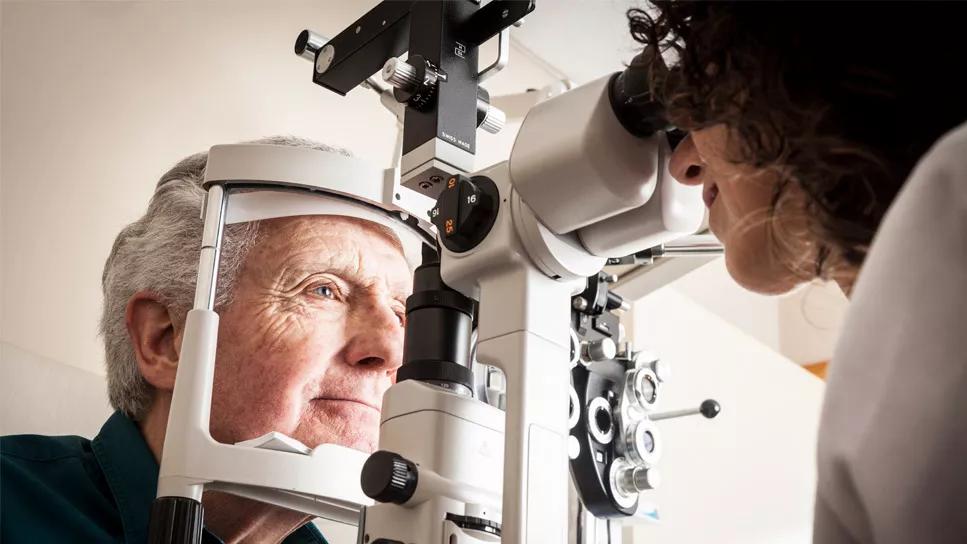Study explores association between sleep aid and eye disease

Image content: This image is available to view online.
View image online (https://assets.clevelandclinic.org/transform/933ff217-8d18-4945-825e-8989a843191f/23-EYE-4284059-CQD-Faricimab-nAMD-patients-prior-therapy-967x544-1_jpg)
Geriatric eye exam
People taking melatonin supplements as a sleep aid are less likely to develop age-related macular degeneration (AMD), according to a recent study by the Center for Ophthalmic Bioinformatics at Cleveland Clinic Cole Eye Institute. In addition, people with existing AMD are less likely to have progression of the disease when they take melatonin.
Advertisement
Cleveland Clinic is a non-profit academic medical center. Advertising on our site helps support our mission. We do not endorse non-Cleveland Clinic products or services. Policy
“People who don’t sleep well have higher rates of many medical conditions, especially inflammatory conditions like AMD,” says the study’s senior author, Rishi P. Singh, MD, a vitreoretinal surgeon at Cleveland Clinic Florida. “There’s been some early research on oral intake of pigment-related items, like melatonin, that could help reduce macular damage over time.”
He notes that a small study in China reported that patients with AMD treated with 3 mg of melatonin for three or more months had slower progression of disease. To determine if the findings could be replicated in a larger, more varied population, the team at Cleveland Clinic conducted a retrospective study of patients in a national database.
“In our Center for Ophthalmic Bioinformatics, we study disease pathogenesis, prognosis and outcomes by harnessing large datasets,” Dr. Singh explains. “We’ve been able to leverage many databases worldwide to help answer questions about some of the rarest, most complex diseases. We also can do it with more common diseases like AMD, which is predicted to double or triple in prevalence over the next few years, depending on demographic.”
The team at Cleveland Clinic evaluated the medical records of more than 120,000 patients age 50 or older who did not have AMD. Nearly 5,000 of them took melatonin. From one year after their index event (defined as either their first eye examination between 2008 and 2023 or the first date they’d had both an eye examination and melatonin prescription) to when the data was collected, patients taking melatonin were 42% less likely to be diagnosed with AMD compared with patients not taking melatonin.
Advertisement
Reduced risk of developing AMD was evident even in older patients who took melatonin (age ≥ 60: relative risk [RR] 0.36; age ≥ 70: RR 0.35).
“This was an important finding because AMD is typically a disease of older age,” Dr. Singh says. “It is notable that we saw an association between taking melatonin and not developing AMD even in older populations.”
The team also evaluated the records of more than 66,000 patients age 50 or older who had dry AMD. More than 4,000 of them took melatonin. From one year after the index event (defined as either a patient’s diagnosis with dry AMD or the first date they’d had both the diagnosis and melatonin prescription) to when the data was collected, dry AMD was less likely to progress to wet AMD in patients taking melatonin compared with patients not taking melatonin (age ≥ 50: RR 0.44; age ≥ 60: RR 0.38; age ≥ 70: RR 0.40).
“Each group taking melatonin had a lower risk of progressing to AMD or later forms of the disease,” Dr. Singh says. “This is in line with what we saw in the Chinese study, although I was surprised to see that melatonin was associated with lower risk of developing AMD in AMD-naïve groups. The protective effect was definitely there.”
Oxidative stress, choroidal neovascularization and dysregulated apoptosis are believed to contribute to the development of AMD. Melatonin may help offset these factors because it confers antioxidant, antiangiogenic and other protective properties, according to in vivo studies.
“For instance, melatonin plays a crucial role in cell survival and regeneration, and these effects have been shown to protect RPE [retinal pigment epithelium] cells, which are particularly vulnerable to damage induced by reactive oxygen species in the retina,” write the authors in the published study. “Since the loss of RPE cells is a hallmark of AMD even in the early stages of the disease, the protective effects of melatonin on RPE cells provide encouraging insight into the clinical use of melatonin in preventing AMD.”
Advertisement
While there appears to be an inverse association between melatonin use and AMD development, it is too soon to declare a causative relationship, cautions Dr. Singh.
“Our exploratory study isn’t enough to advise patients to take melatonin to lower risk of AMD, but it may be enough to suggest a prospective, randomized trial testing melatonin supplementation in a population at risk for AMD,” he says. “Melatonin is quite low cost and easily accessible. It may be worthwhile to do this research now as we’re anticipating a drastically rising prevalence of AMD in coming years.”
Advertisement
Advertisement
New insights on effectiveness in patients previously treated with other anti-VEGF drugs
Evidence mounts that these diabetes and obesity drugs may protect eyes, not endanger them
CFH gene triggers the eye disease in white patients but not Black patients
A primer on sustained release options
Early data show risk is 73% higher in patients with lupus, 40% higher in patients with rheumatoid arthritis
Switching medications may decrease treatment burden and macular fluid
Why retina specialists should get comfortable with this imaging tool
Strengthening care through targeted resources and frontline voices